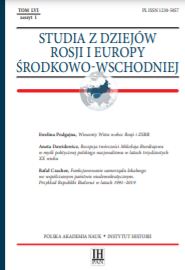Milovan Đilas - polityk, myśliciel, analityk systemu komunistycznego. Cz. 1: Buntownik i komunista
A Politician,Thinker, Analyst of the Communist System. Part 1: A Rebel and Communist
Author(s): Michał Jerzy ZachariasSubject(s): Political history, Recent History (1900 till today), Marxism, Government/Political systems, WW II and following years (1940 - 1949), History of Communism
Published by: Instytut Historii im. Tadeusza Manteuffla Polskiej Akademii Nauk
Keywords: Milovan Đilas; Karl Marx; Joseph Stalin; Josip Broz Tito; communism; Yugoslavia; ‘new class’; leftist bias; 1948 Soviet-Yugoslav conflict;local government system; party political bureaucracy; Third Ex
Summary/Abstract: In the article, Michał Jerzy Zacharias presents the evolution of the political stance, especially the political thought of Milovan Đilas on the so-called ‘new class’ and the communist system: its origins, character, and inevitable collapse. This evolution concerns the formation, nature, transformations, and unavoidable - in the opinion of the Yugoslav analyst - collapse of this system. The author draws attention to the views and concepts of the ‘new class’ as depicted by his predecessors, starting with Nikolai Bakunin. He makes the readers aware of the fact that The New Class’ author was neither the first nor the only thinker to emphasise the negative role of the new ruling strata that emerged after the revolution and subjugated the whole society. Zacharias also provides facts proving that, according to Đilas, the ‘new class’, i.e. the party (communist) political bureaucracy, was a completely different phenomenon from the classes of the capitalist system. First of all, due to the power monopoly in every fi eld: political, economic, and ideological. Đilas stresses that in bourgeois societies, individual classes and their emanations, political parties, always had to be content with only a partial share in power and only political. This monopolisation of power in all possible areas by the ‘new class’ leads Đilas to conclude that the communist system is truly “a power that has become an end in itself ”. Such an approach is entirely at variance with the theories of Karl Marx, and also others, in practice, all Marxist theoreticians contemporary with the Das Kapital’s author. All this, even though Đilas uses Marxist concepts, theoretical categories and Marxist, class-based analysis of economic, social, and political processes. Noteworthy is also his insightful analysis of the collapse of the communist system. Both in his Th e New Class and later works, he would write that it was the internal contradictions, the existence and operations of the ‘new class’ that became the fundamental reasons for the collapse of communism - its decay and self-destruction.
Journal: Studia z Dziejów Rosji i Europy Środkowo-Wschodniej
- Issue Year: 56/2021
- Issue No: 1
- Page Range: 93-121
- Page Count: 29
- Language: Polish

